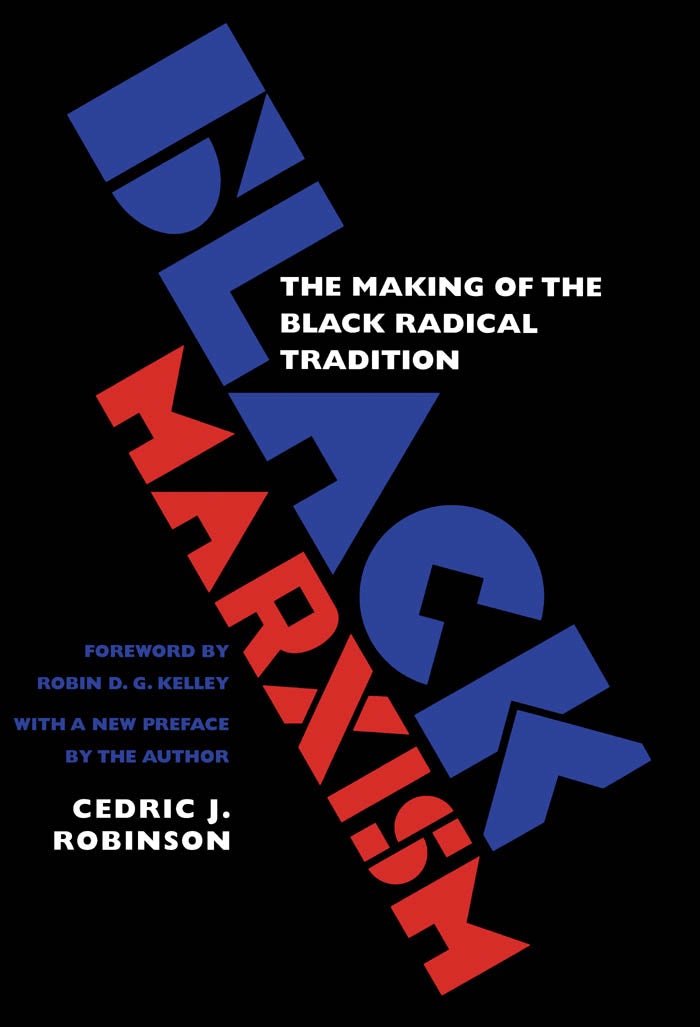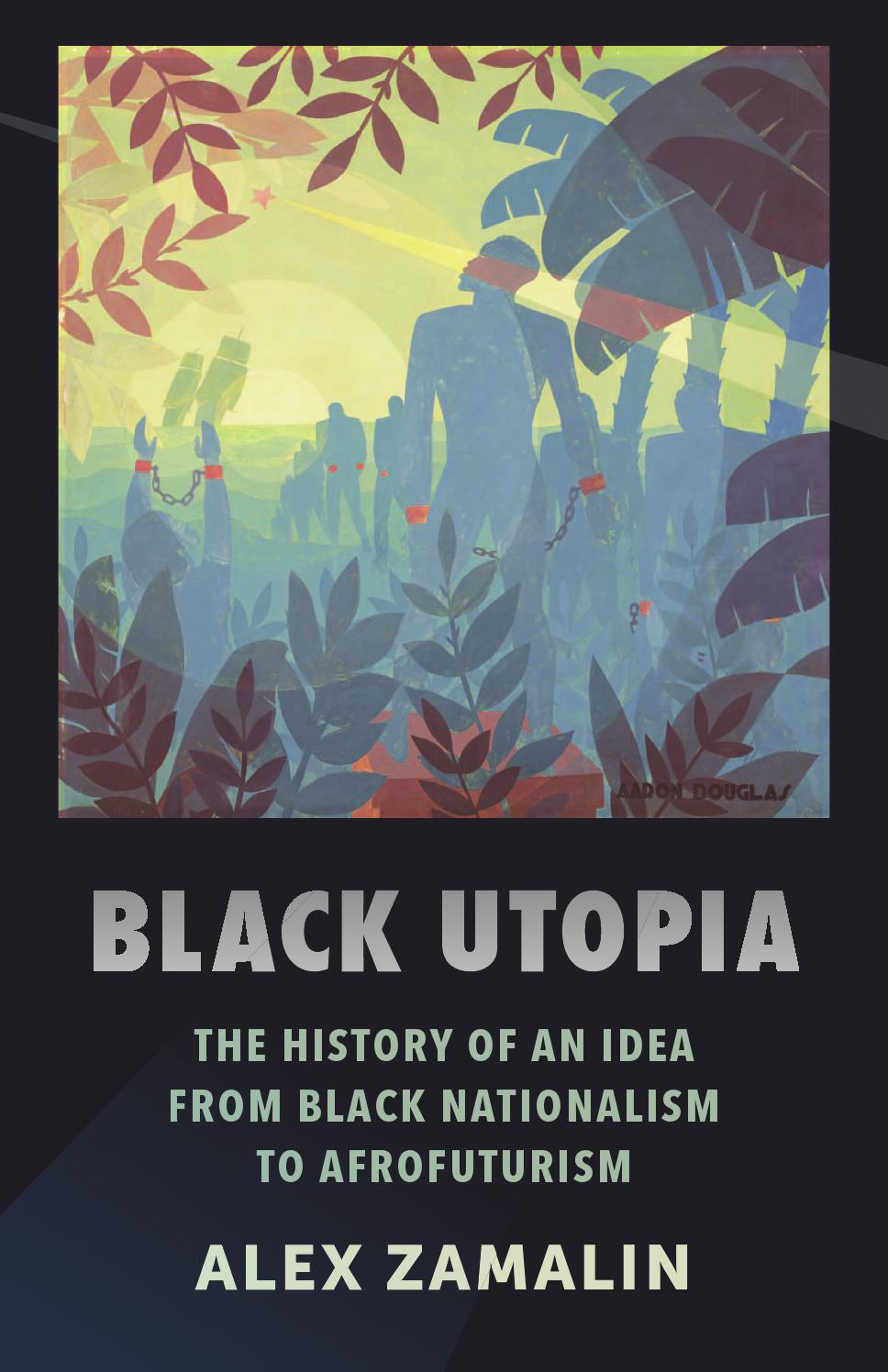Cedric J. Robinson: Black Marxism: The Making of the Black Radical Tradition (1983–)
Filed under book | Tags: · black people, capitalism, communism, marxism, race, slavery, socialism

“In this ambitious work, Cedric Robinson demonstrates that efforts to understand black people’s history of resistance solely through the prism of Marxist theory are incomplete and inaccurate. Marxist analyses tend to presuppose European models of history and experience that downplay the significance of black people and black communities as agents of change and resistance. Black radicalism must be linked to the traditions of Africa and the unique experiences of blacks on western continents, Robinson argues, and any analyses of African American history need to acknowledge this.
To illustrate his argument, Robinson traces the emergence of Marxist ideology in Europe, the resistance by blacks in historically oppressive environments, and the influence of both of these traditions on such important twentieth-century black radical thinkers as W. E. B. Du Bois, C. L. R. James, and Richard Wright.”
Foreword by Robin D. G. Kelley
Publisher Zed Press, London, 1983
487 pages
Second edition
New Preface by the author
Publisher University of North Carolina Press, Chapel Hill, NC, 2000
ISBN 0807848298, 9780807848296
xxxiii+436 pages
Third edition, Revised and updated
New Preface by Damien Sojoyner and Tiffany Willoughby-Herard
Publisher University of North Carolina Press, Chapel Hill, NC, 2021
ISBN 1469663724, 9781469663722
liii+436 pages
Commentary: Robin D. G. Kelley (Boston Review, 2017), .
Reviews: Cornel West (Monthly Review, 1988), Black Perspectives roundtable (2016): Paul Hébert, Joshua Guild, Jennifer L. Morgan, Carole Boyce Davies, Austin McCoy, Robyn C. Spencer; Bedour Alagraa (CLR James Journal, 2018), Austin Smidt (PPE Sydney, 2020), Minkah Makalani (Boston Review, 2021).
PDF (2nd ed., 2000, 14 MB)
PDF (3rd ed., 2020, 4 MB)
See also Robinson’s An Anthropology of Marxism (2001).
Comment (0)Avery F. Gordon: The Hawthorn Archive: Letters from the Utopian Margins (2018)
Filed under book | Tags: · abolitionism, anarchism, archive, black people, capitalism, colonialism, friendship, politics, race, racism, slavery, utopia

“The Hawthorn Archive, named after the richly fabled tree, has long welcomed the participants in the various Euro-American social struggles against slavery, racial capitalism, imperialism, and authoritarian forms of order. The Archive is not a library or a research collection in the conventional sense but rather a disorganized and fugitive space for the development of a political consciousness of being indifferent to the deadly forms of power that characterize our society. Housed by the Archive are autonomous radicals, runaways, abolitionists, commoners, and dreamers who no longer live as obedient or merely resistant subjects.
In this innovative, genre- and format-bending publication, Avery F. Gordon, the “keeper” of the Archive, presents a selection of its documents—original and compelling essays, letters, cultural analyses, images, photographs, conversations, friendship exchanges, and collaborations with various artists. Gordon creatively uses the imaginary of the Archive to explore the utopian elements found in a variety of resistive and defiant activity in the past and in the present, zeroing in on Marxist critical theory and the black radical tradition. Fusing critical theory with creative writing in a historical context, The Hawthorn Archive represents voices from the utopian margins, where fact, fiction, theory, and image converge.
Reminiscent of the later fictions of Italo Calvino or Walter Benjamin’s Arcades Project, The Hawthorn Archive is a groundbreaking work that defies strict disciplinary, methodological, and aesthetic boundaries. And like Ghostly Matters: Haunting and the Sociological Imagination, which established Gordon as one of the most influential interdisciplinary scholars of the humanities and social sciences in recent years, it provides a kaleidoscopic analysis of power and effect. The Hawthorn Archive’s experimental format and inventive synthesis of critical theory and creative writing make way for a powerful reconception of what counts as social change and political action, offering creative inspiration and critical tools to artists, activists, scholars across various disciplines, and general readers alike.”
Publisher Fordham University Press, 2018
ISBN 0823276325, 9780823276325
xii+472 pages
Interview with author: Krystian Woznicki (transversal, 2019).
Review: Eddie Bruce-Jones (Race & Class, 2019).
PDF (46 MB)
Comment (0)Alex Zamalin: Black Utopia: The History of an Idea from Black Nationalism to Afrofuturism (2019)
Filed under book | Tags: · afrofuturism, black people, blackness, fiction, freedom, gender, human rights, literary criticism, race, science fiction, utopia

“Within the history of African American struggle against racist oppression that often verges on dystopia, a hidden tradition has depicted a transfigured world. Daring to speculate on a future beyond white supremacy, black utopian artists and thinkers offer powerful visions of ways of being that are built on radical concepts of justice and freedom. They imagine a new black citizen who would inhabit a world that soars above all existing notions of the possible.
In Black Utopia, Alex Zamalin offers a groundbreaking examination of African American visions of social transformation and their counterutopian counterparts. Considering figures associated with racial separatism, postracialism, anticolonialism, Pan-Africanism, and Afrofuturism, he argues that the black utopian tradition continues to challenge American political thought and culture. Black Utopia spans black nationalist visions of an ideal Africa, the fiction of W. E. B. Du Bois, and Sun Ra’s cosmic mythology of alien abduction. Zamalin casts Samuel R. Delany and Octavia E. Butler as political theorists and reflects on the antiutopian challenges of George S. Schuyler and Richard Wright. Their thought proves that utopianism, rather than being politically immature or dangerous, can invigorate political imagination. Both an inspiring intellectual history and a critique of present power relations, this book suggests that, with democracy under siege across the globe, the black utopian tradition may be our best hope for combating injustice.”
Publisher Columbia University Press, New York, 2019
ISBN 9780231187404, 0231187408
x+182 pages
Reviews: Smaran Dayal (Social Text, 2020), David A. Lemke (Utopian Studies, 2020), Francis Shor (J American History, 2020), Ladee Hubbard (TLS, 2019).
Comment (0)
